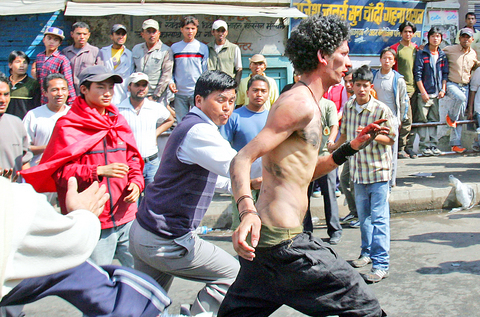Twelve people were hurt, two seriously, as police in Nepal's capital yesterday fired rubber bullets and used force to stop anti-king protesters from reaching the seat of power, doctors and police said.
Two protesters were hit by rubber bullets in clashes with police during an 11-hour curfew on the outskirts of Kathmandu as a general strike against King Gyanendra's absolute rule neared its third week.
The protesters were trying to cross into the city limits, when police first fired tear gas and then opened fire with rubber bullets, the independent Kantipur television said.

PHOTO: AP
The crowd quickly dispersed after the shooting and the injured were driven to hospital in a UN vehicle, the report said.
"Two protesters hit by rubber bullets were just brought in," said Dr. Santosh Giri, in the emergency department of B&B Hospital.
"One of them is in a serious condition as he has been hit in the neck," the doctor said.
Thousands of other people marched in Kathmandu's Kalanki and Gangabu neighborhoods -- which have been the center of the protests for the past few days.
There were clashes in four different areas of the city, but on a much smaller scale than disturbances on Saturday when more than 100 people were hurt.
A senior officer, on condition of anonymity, said the curfew had been strictly enforced following Saturday's march by 300,000 people on the center of the city to within 1km of the king's palace.
"The curfew has been strictly enforced today and we're not going to take any chances," the officer said.
At least 14 people have died and hundreds have been injured in clashes between pro-democracy activists and security forces in Nepal in an upsurge of civil unrest that began on April 6.
A protester wounded during a demonstration four days ago died from bullet wounds yesterday after undergoing treatment in India.
Ten protesters were taken to Kathmandu Model Hospital yesterday, including one with serious head injuries, Dr. Sarita Pandey said.
A heavier than usual contingent of soldiers, armed with machine-guns, were posted every few hundred meters around the perimeter of the royal palace yesterday, reporters said. The army had also strung barbed wire to block off some inner alleys and major intersections yesterday.
Protests were also taking place outside the capital. In the southern town of Bharatpur, hundreds of women -- some carrying their children -- banged plates and utensils in protest at the king's rule.
In Nepalgunj, 500km southwest of Kathmandu, farmers on plows and bullock carts destroyed a statue of King Tribhuwan, Gyanendra's grandfather.

A Chinese aircraft carrier group entered Japan’s economic waters over the weekend, before exiting to conduct drills involving fighter jets, the Japanese Ministry of Defense said yesterday. The Liaoning aircraft carrier, two missile destroyers and one fast combat supply ship sailed about 300km southwest of Japan’s easternmost island of Minamitori on Saturday, a ministry statement said. It was the first time a Chinese aircraft carrier had entered that part of Japan’s exclusive economic zone (EEZ), a ministry spokesman said. “We think the Chinese military is trying to improve its operational capability and ability to conduct operations in distant areas,” the spokesman said. China’s growing

Taiwan yesterday denied Chinese allegations that its military was behind a cyberattack on a technology company in Guangzhou, after city authorities issued warrants for 20 suspects. The Guangzhou Municipal Public Security Bureau earlier yesterday issued warrants for 20 people it identified as members of the Information, Communications and Electronic Force Command (ICEFCOM). The bureau alleged they were behind a May 20 cyberattack targeting the backend system of a self-service facility at the company. “ICEFCOM, under Taiwan’s ruling Democratic Progressive Party, directed the illegal attack,” the warrant says. The bureau placed a bounty of 10,000 yuan (US$1,392) on each of the 20 people named in

Nine retired generals from Taiwan, Japan and the US have been invited to participate in a tabletop exercise hosted by the Taipei School of Economics and Political Science Foundation tomorrow and Wednesday that simulates a potential Chinese invasion of Taiwan in 2030, the foundation said yesterday. The five retired Taiwanese generals would include retired admiral Lee Hsi-min (李喜明), joined by retired US Navy admiral Michael Mullen and former chief of staff of the Japan Self-Defense Forces general Shigeru Iwasaki, it said. The simulation aims to offer strategic insights into regional security and peace in the Taiwan Strait, it added. Foundation chair Huang Huang-hsiung

PUBLIC WARNING: The two students had been tricked into going to Hong Kong for a ‘high-paying’ job, which sent them to a scam center in Cambodia Police warned the public not to trust job advertisements touting high pay abroad following the return of two college students over the weekend who had been trafficked and forced to work at a cyberscam center in Cambodia. The two victims, surnamed Lee (李), 18, and Lin (林), 19, were interviewed by police after landing in Taiwan on Saturday. Taichung’s Chingshui Police Precinct said in a statement yesterday that the two students are good friends, and Lin had suspended her studies after seeing the ad promising good pay to work in Hong Kong. Lee’s grandfather on Thursday reported to police that Lee had sent